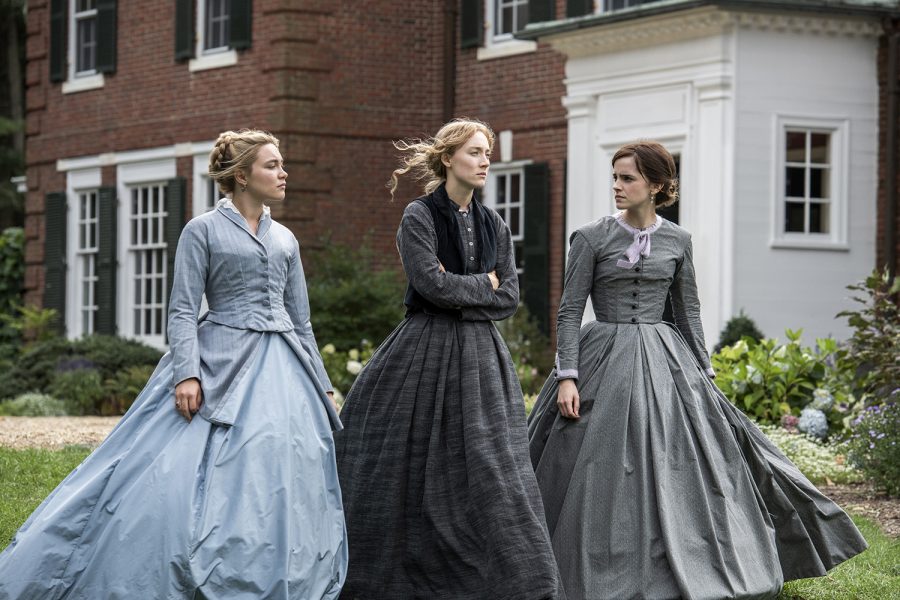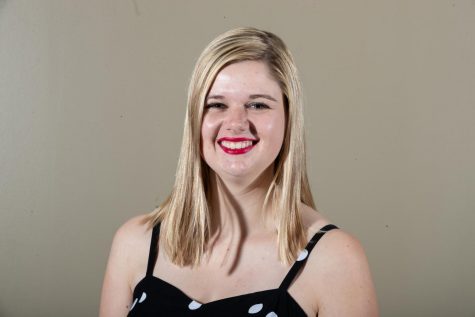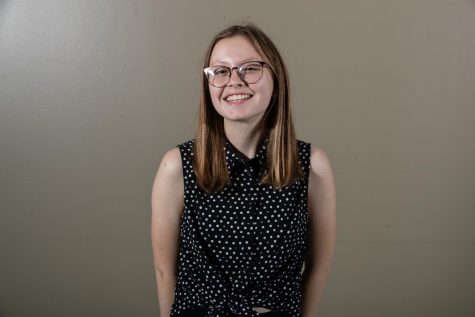Binge Break: DI women on Little Women
Little Women isn’t just about women. It’s about life and family, something that any viewer can find meaning in — something the new film proves.
Florence Pugh, Saoirse Ronan and Emma Watson in Greta Gerwig's "Little Women." (Wilson Webb/Sony Pictures/TNS)
January 20, 2020
Managing Editor Kayli Reese
Back when Netflix was better known as a rental service that would mail you DVDs (wow, what an old-fashioned sentence), my dad rented Dead Poets Society because he thought I might like it. I proceeded to watch the film every day for two months straight until I was asked if I could part with it, already, please.
Since then, I’ve purchased Dead Poets Society, and I still cry every time I watch it. The story is warm and welcoming, a dear friend to me even in its most tragic moments. Dead Poets Society centers on a group of boys at a boarding school whose lives are changed after meeting Professor Keating (Robin Williams) and falling in love with poetry and the written word.
It never mattered to me that the story was all about boys and their experiences. The fact that Dead Poets Society is a film about boys made by men did not stop me from deeply connecting with the story. It’s what helped me find my love of words.
I thought about my connection with Dead Poets Society both times I saw Little Women over winter break. At both showings, packed to the brim with excited moviegoers, not a single man was there to watch.
Obviously, Little Women is a heavily female-centric story about the lives of the March sisters during the Civil War, based off the beloved Louisa May Alcott book. The story takes the audience on a journey through the lives of four sisters as they grow up into women and try to create the best life possible they envision for themselves.
Since its publication, the novel has stemmed multiple on-screen adaptations and “What March sister are you?” quizzes (I’m an Amy but sometimes a Jo). Now, director/writer/actress/actual-genius-goddess Greta Gerwig has brought the latest version of the film to the masses.
Little Women now, as I sit and constantly think about everything Gerwig and the star-studded cast brought to the story, is rivaling Dead Poets Society as the greatest film I’ve ever seen. I knew the story of Little Women before I walked into the theater, but it was like watching it with fresh eyes. Each March sister felt more vivid and real to me than they have before, and the incredible performances by the Oscar-nominated cast are nothing short of spectacular.
Gerwig did something magical here, something that landed Little Women a Best Picture nomination at the upcoming Academy Awards (although no Best Director nomination for Gerwig or any other women).
Personally, I feel like I can tell when a film is made by a woman, because there’s something on screen, something in the way that the story is presented, that I’m not used to seeing — probably because I’m so used to seeing films made by men. I still love the stories male filmmakers bring to theaters. But I don’t feel as seen, feel as one with the art form until I’m watching a female-led film. My story suddenly becomes important enough for the big screen, too.
Without Gerwig and other female filmmakers like her, stories like this wouldn’t be shared on screen in the way that they need to be. I’ll spend the rest of my days in their debt.
It’s Gerwig’s touch that makes the story sparkle fresh, that gives justice to Amy March, that gives us Timothée Chalamet with his very best hair, that made me cry for an entire two hours.
I don’t think that, if a man had walked into one of the Little Women showings I was at, that he would’ve had a difficult time connecting with the story. After all, I was able to find meaning in over 70 viewings of Dead Poets Society, despite the fact that there is only one woman in the movie.
Little Women is one example of a film that so firmly believes in the agency of its female protagonists and highlights the strength of a sisterly bond. It’s something I feel I don’t get to see on screen as often as I like, as often as needed (it has been increasing in recent years, but there’s still so much work to do).
I think nothing of seeing and celebrating films centered on men, because that’s what I often have to do. I think everything of seeing and celebrating films centered on women, because it feels so novel and breathtaking, every time.
Arts Editor Madison Lotenschtein
Greta Gerwig’s adaptation of Little Women left me in a state of awe while leaving the theater a few chilly nights ago. I am a Little Women fan, and I mean a fan. I picked up my first copy of Little Women at age 8. While I cannot recall finishing it (I was 8 years old, and the Magic Tree House books were just so easy to read), I do remember how foreign yet familiar author Louisa May Alcott’s story seemed.
I watched the 1994 Little Women film that featured Winona Ryder as Jo March. I wrote about the Little Women Opera performed by the University of Iowa School of Music last year. I cried when Beth died, cheered for Jo and Meg and sneered at Amy. But Gerwig’s adaptation brings home the gold because of her immaculate screenplay and ability to tell a 19th century story to a 21st century audience.
Unlike the 1994 film, the 2019 adaptation descends in chronological order but through two different time periods. One period shows the sisters grown up, separated, and slowly making their journey home to Beth, who is ill from complications that scarlet fever left her seven years prior.
The other time period takes place seven years in the past, when the sisters all still lived at home, sharing the ups and downs of life together. As someone who knows the plot by heart, I found the screenplay fresh, upbeat, and able to keep the audience on its toes. Though, according to a couple of friends and some family members, the plot was sometimes difficult to keep track of due to the screen’s time travel.
One of the proponents of Little Women that I find so marvelous is that it reveals the hardships that young women of the 19th century endured, particularly the pressure to marry wealthy being an imperative step toward a woman living a “good” life. A bulk of 19th-Century literature pages are filled with heroines that are happily married by the end. Alcott’s novel ends with marriage too, but her characters struggle with its ideals.
Several scenes demonstrate the March sisters’ frustration to their unfair society: Amy explains to Laurie why marrying matters economically to her, Jo wishes to never marry, Meg wants to marry but her significant other is poor, and Beth never meets a suitor due to her shyness and unlikely (yet likely) demise. Watching Little Women as a 21st century woman was a delight because Gerwig dove deep into how these hardships of marrying or not marrying still make its societal mark on women today, even if they differ from an 1868 viewpoint.
To add to my never-ending praise, the character of Amy (played by Florence Pugh) was given a powerful voice that resonates with thousands of people who feel as if their work is mediocre, that they are below someone else’s artistic talent. For Amy, this someone else is her older sister, Jo (played by Sairose Ronan), the writer of the family. While I tend to despise Amy because of her selfish and vain attributes, Gerwig enabled a feeling of understanding to wash over me.
Many people consider a story from so long ago to be dull, boring, and often times confusing. Greta Gerwig proves all these doubters wrong by sticking to Alcott’s vision while making the story accessible to 21st-Century minds. If you have the slightest notion to see Little Women, I suggest you head straight toward your local theater. You don’t want to miss out on this.
















